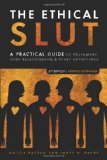I am leading a read-through of The Ethical Slut, 2nd edition. If you’d like to catch up on past installments, check the list at the bottom of the series introduction. Comments on the topics in this discussion are welcome anytime, even from people who aren’t following along in the book.
This week, the read-along returns with a discussion based on Chapter 15, “Making Agreements.”

It’s been a while since I had time to work on this read-along project. Burning Flipside has come and gone, a definite high point in the year for my poly-family and I. Now that life is back to what approximates normal, I can return to reading, thinking, and talking about polyamory here on my blog.
In this chapter of The Ethical Slut, 2nd edition, Easton and Hardy point out that unspoken agreements govern much of our lives: the social contract which governs civilized modern life is really a series of agreements with society which we learn in childhood. Some of those agreements are ones that those of us who take non-traditional paths in our lives eventually break, at varying cost to our ability to fit into “mainstream” society. On the other hand, many of them are benevolent rules which support civil behavior and help us function.
This is a topic which has interested me for a long time; as I get more experienced in polyamory and kink, especially BDSM, I become more acutely aware of the unspoken agreements and power exchanges which occur all around us without most people seeming to notice. Far too often I notice relationships of all kinds where one member exerts great control over another without either one apparently haven’t discussed, acknowledged, or clearly consented to it.
As someone who is in so many carefully negotiated relationships, it can make me very uncomfortable to see others doing so unthinkingly. When we step outside the mainstream once (“is monogamy the only way?”), it presents us with a chance to reevaluate other aspects of the cultural package (“does the protestant work ethic really make me happy?”). In a similar fashion, polyamory can lead to making conscious agreements with one’s lover or lovers that replace cultural assumptions with boundaries created by conscious choice.
The book points out that not all agreements must be equal as long as they make everyone in a relationship comfortable. Likewise, while I believe that all humans deserve equal treatment, another person can choose to give up some aspect of that if it creates a sense of mutual security and pleasure. My lover, Mizz Honey J, is a strong feminist in her everyday life — but it makes her happy if I order food for her in restaurants when acting as her dominant. The fact that she consents to and enjoys this loss of power is what makes all the difference.

To give a further example, it gives Pet a sense of great security to feel under my control even when we are apart. Though in theory she is free to date others, she chooses to get my permission for anyone she might see (permission I will essentially always grant), and makes it clear that interested dominants and potential play partners have to talk to me first. It’s not something I’d ask of a partner, but it is something I will happily agree to because of how it makes her feel. By contrast, we both know such agreements would make me feel trapped and miserable, so instead I make her feel secure in other ways such as communicating often and in detail about my other relationships and potential interests.
There are a few things that to me are important to healthy agreements which the book touches on but I’d like to emphasize here. One is knowing what is important to you; this is impossible if you don’t spend time on self-reflection and owning your feelings.
Obviously most people reading this want some form of non-monogamous or at least non-traditional relationships, but what happens when a lover or partner asks us to give up some aspect of that openness for them, temporarily or indefinitely? Only you can answer what is healthy for you at any given moment. Most of the agreements we’ll be asked to consider are over relatively small matters — it was easy to agree when my pet asked that no one else in my life be called “pet,” because I was still free to engage in the full range of actions with my other lovers while keeping a single word reserved — but I couldn’t agree to this safely without knowing that it protects what is important to me while giving Pet something special.
After knowing what I want, another thing that ensures good agreements is that we’re all looking out for each other while also seeing to our own needs. While we’re all trying to seek out what we need to feel secure, loved and happy, at the same time we’re also aware of not making others feel trapped, unhappy, or less free to live our lives as we choose. My life would not work as well as it does now if any of us felt resentful about what anyone else needs, or were trying to change each other, or ‘win’ in a competition.
“One of the things that works about reassurance is that once we understand that our partner, or partners, or maybe even also their partners, are willing to help us with our feelings, we feel more secure and need less and less protection as we go along.” –from The Ethical Slut, 2nd edition
Agreements must be fluid, because we grow less worried and feel safer over time. It has come up here before, but experience makes polyamory easier. At the same time, as we grow more free to explore we also sometimes discover new things about which we need to negotiate. Similarly, it’s a poor agreement which is incapable of being a little flexible (or “fuzzy” as Hardy and Easton put it at one point) to allow for the kinds of special circumstances which life frequently sends our way.
Overall this was a good chapter, but I did feel like it assumed its readers would be making agreements from within groups of two, particularly a primary partnership. There were good tools for everyone, and it did not ignore the alternatives, but I felt there was less help for making agreements if you’re working from the perspective of a single person dating many people, or in relationships like triads or quads, or even bigger groups. This is one of the criticisms I have sometimes heard others cite about The Ethical Slut — that it assumes the existence of a primary relationship — and is one of the reasons I’m curious to read Opening Up, which some have suggested handles this topic better.
Next week on Thursday, June 23 I plan to discuss Chapter 16, “Opening an Existing Relationship.” Since this is not a topic about which I have much experience, I have asked a number of guest bloggers to share the lessons they’ve learned from opening up their relationships. Look for those posts in the coming weeks.
I’ve discussed a few sample agreements I’ve made here. What are some you have made which worked, or if they didn’t, how did you renegotiate them?